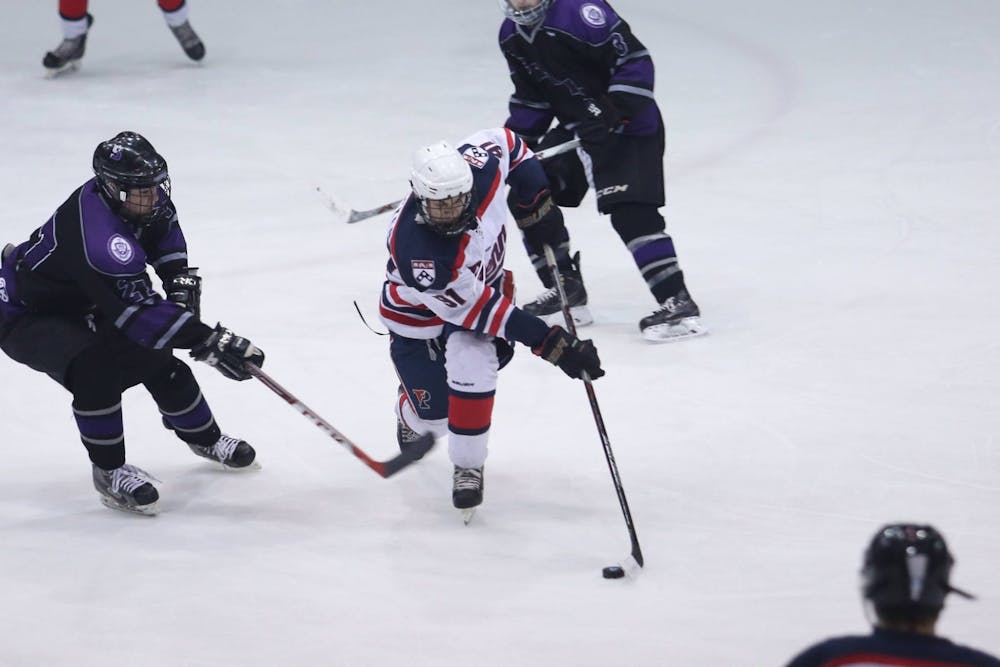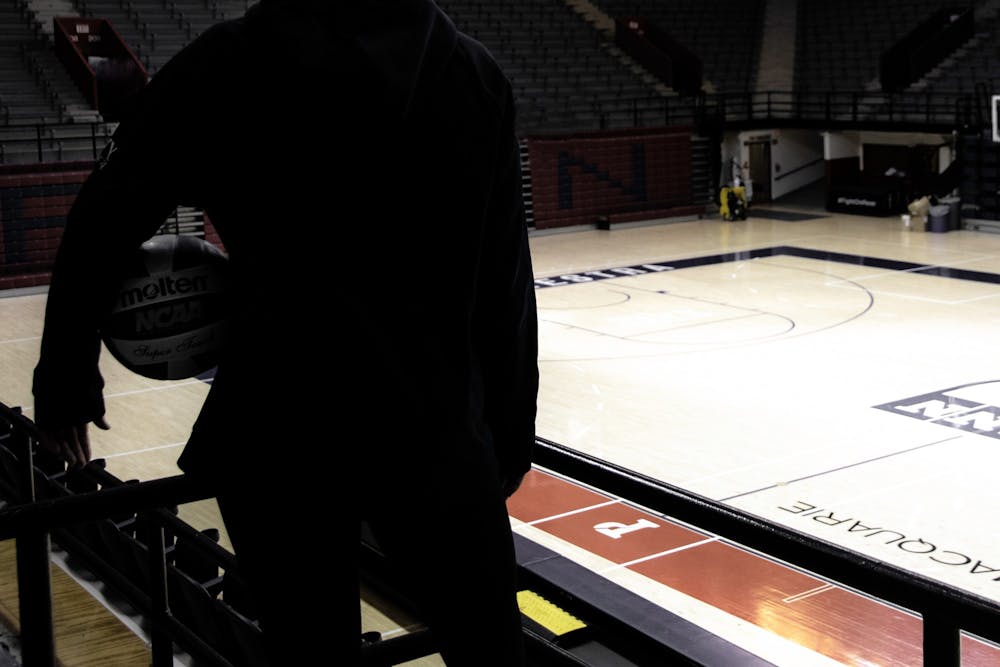
It's hard to imagine Penn without basketball or lacrosse. But 40 years ago, one might have said the same thing about hockey.
Brown’s recent decision to cut eight of its varsity sports came as a surprise to the campus community and the athletes themselves. The move also completely changed the composition of Brown athletics, and raises the question of how Penn’s own athletic programs have shifted over the years.
Indeed, four decades ago, students regularly took in varsity men’s volleyball games at Weightman Hall. And the Quakers used to count themselves among the pioneers of collegiate ice hockey, before the program was cut in 1978.
All it takes is a walk down Walnut to feel the loss. Overlooking Penn Park, the Class of 1923 Arena is the former home to Penn’s varsity ice hockey team, and now belongs to both the men’s and women’s club teams. Complete with seating for more than 2,500 fans and a press box, it’s nicer digs than most club sports can claim for their own.
Most of that is due to a recent $7 million renovation completed in October 2019, with the current players and alumni hopeful that such an investment will be a step towards reinstating a NCAA program.
Penn hockey last took the ice in 1978 under the banner of a varsity team. The Red and Blue competed in the Eastern College Athletics Conference, and while not quite a powerhouse, the Quakers notched several impressive seasons and proved their potential in a competitive league.
In 1973, just three years after the Class of 1923 Arena first opened its doors and five years before the elimination of the program, the Quakers’ record of 16-9-2 earned them a berth to the ECAC tournament. In the first round, Penn upset Boston University, the defending champions, by a score of 7-3.
The decision to cut the program at the time was in the financial interest of the university. Sending hockey down to club status would eliminate the $75,000 cost of running the varsity program, putting a dent in the reported $500,000 debt Penn was facing in 1978. Athletics were not the only program to struggle, either; the Annenberg Center was forced to eliminate professional theatre productions that year as well.
The initial decision also saw the gymnastics, badminton, and golf teams cut from varsity status, but following a four-day sit-in by 800 students in College Hall, every team but hockey was ultimately reinstated.
While Penn’s financial troubles of the late 70s are nothing but a memory now, after more than forty years without a varsity program, the Quakers face new obstacles returning to Division I. If Penn has hopes of one day rejoining its Ancient Eight rivals on the ice, the road will not be easy.
Of the eight schools, Penn and Columbia are the only two not to currently offer a varsity program. However, Columbia has a better excuse, as it does not have an ice rink.
The rest of the Ivy League comprises some of the oldest collegiate hockey teams in the country and have developed formidable competition, both from the men and women. At the start of the 2019-20 NHL season, 11 former Ivy League players landed spots on opening night rosters, with every school but Dartmouth represented. At the 2018 Olympics in Pyeongchang, seven Ivy League women’s hockey players walked away with silver medals representing Team Canada.
The renovations to the Class of 1923 Arena have provided the Quakers with a facility that is Division I caliber, but Penn Athletics has not yet given its official support to a potential varsity hockey team.
For that to happen, Penn hockey must prove their ability to raise funds and interest within the community. Achieving that, they would first join NCAA Division III, as described in their ‘Vision 2025’ plan.

While the Quakers are in the minority among Ivy rivals with the absence of a varsity hockey team, Penn also lacks a program offered by only two other Ancient Eight schools: men’s volleyball.
The women’s varsity volleyball program has long been a cornerstone at the Palestra, but men who wish to continue their volleyball career in college must turn to Penn’s club team. The Quakers currently compete in the Eastern Collegiate Volleyball Association, and earned a fifth-place finish at the 2018 National Club Volleyball Federation tournament.
The limited number of varsity men’s volleyball teams across the country forces many high-level athletes to compete at the club level, skyrocketing the caliber of competition in the NCVF. However, Penn was formerly among the few universities to offer an NCAA program.
The Quakers last offered a men’s varsity team in the late 1980s. From 1981 to 1989, the team was coached by Joe Sagula, who simultaneously led the women’s team to three Ivy titles. Over their nine years under Sagula, the men’s team put up an overall record of 111-75. Sagula since left the Quakers for a coaching position at UNC, and Penn men’s volleyball became a permanent club team.
Currently, Princeton and Harvard are the only Ivy League schools to offer a varsity men’s program. Both universities compete in the Eastern Intercollegiate Volleyball Association. Harvard was the EIVA champion in 2018, earning a berth to the NCAA tournament, while Princeton took the title the following year.
Men’s volleyball opportunities are limited within the NCAA, with only 23 universities offering Division I programs and the divisional structure of the NCAA tournament a relatively new development in 2012. Due to Title IX restrictions about equal opportunities for male and female athletes, it is extremely difficult for universities to sponsor varsity men's volleyball.
This is especially true at Penn, because they have a football and sprint football team — one of only seven in the country — that both feature a large number of male athletes with no female counterparts.
This, along with the already competitive nature of club volleyball, indicates that it’s unlikely changes are coming to Penn’s program any time soon.
Looking back at Penn's athletics history, it’s hard to predict which sports might thrive or falter in the future. Perhaps, forty years from now, Penn students will find themselves at the Class of 1923 Arena, watching a varsity hockey game once again.
Or maybe there will be a new sport competing for the Red and Blue entirely.
Penn Athletics Director Dr. M Grace Calhoun did not respond when asked to comment on the future of these sports at the university.
The Daily Pennsylvanian is an independent, student-run newspaper. Please consider making a donation to support the coverage that shapes the University. Your generosity ensures a future of strong journalism at Penn.
Donate



